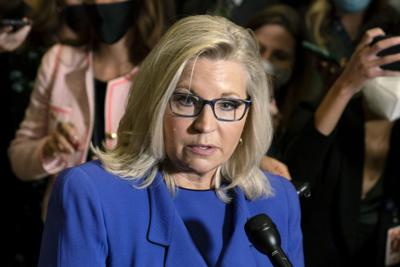Liz Cheney couldn’t have known that Mike Johnson would become speaker of the House when she was writing her new book, “Oath and Honor: A Memoir and a Warning.” Honestly, few saw the Benton Republican’s ascent coming.
But Cheney, a member of House Republican leadership before she lost her post and ultimately her seat for speaking truth about Donald Trump’s attempts to stay in office after he lost the 2020 election, still saw fit to delve deep into Johnson’s behavior leading up to the Jan. 6, 2021 attack on the Capitol.
Read the book and you’ll understand why. Through a focus on Johnson’s actions, she lays bare the dynamics that led to that terrible day — and that still put our democracy at risk.
Johnson’s public piousness aside, Cheney paints the man she’s known since they were both elected in 2016 as devious, and so in Trump’s thrall that he was “willing to do things he knew to be wrong to placate” the former president, as she put it on MSNBC recently.
Much of her narrative focuses on Johnson’s efforts to collect support for an amicus brief backing a Texas lawsuit that sought to invalidate election results in four swing states. In December 2020, Johnson asked House Republicans to sign on and noted that Trump was eagerly awaiting a list of who did.
“Twenty minutes after Johnson’s email went out, I started hearing from fellow members of Congress,” she wrote. “They were angry with Mike’s implied threat.”
Cheney wrote that the email came before a draft brief was distributed and that Johnson misled his colleagues about its scope.
“He was playing bait and switch, assuring members that the brief made no claims about specific allegations of fraud when, in fact, it was full of such claims,” Cheney wrote. She recounted how then-Minority Leader Kevin McCarthy first told her he wouldn’t sign it, but ultimately succumbed to pressure and did, along with 124 other Republicans including Louisiana Reps. Steve Scalise, Clay Higgins and Ralph Abraham.
“The amicus-brief episode revealed a side of Mike I had not seen before. He appeared especially susceptible to flattery from Trump,” Cheney wrote. She said when she confronted him with flaws in his arguments — Cheney, like Johnson, is a lawyer — “Johnson would often concede, or say something to the effect of ‘We just need to do this one last thing for Trump.’ ”
With comments like those in mind, Cheney hoped the U.S. Supreme Court's rejection of the desperate suit would end the matter. But then Johnson bashed the high court, saying “so much for the rule of law.”
“This was ludicrous,” she wrote. “Conservatives held a 6-to-3 advantage on the Supreme Court, and three of those conservative justices had been appointed by Trump. Not one of them had agreed with Mike — not one.”
There’s more in Cheney’s telling, including details of the maneuvering as Jan. 6 approached — she quotes McCarthy’s chief counsel calling Johnson's contention that Congress could overturn state certifications wrong and “astonishing” — but you get the point. When the country needed its leaders to safeguard bedrock democratic principles even if their side lost, Johnson fell far short, and instead fueled the misinformation that led to the attack on Congress.
Now, it’s surely tempting for some of Cheney’s fellow Republicans to say that this is old news.
But there’s a problem with just moving on, and it’s that Johnson is still playing the enabler.
Soon after he became speaker, Johnson started releasing hours of raw Jan. 6 security footage, at the urging of Trump sympathizers who still claim the official version of events — backed by the findings of the investigative committee on which Cheney served — is false. Brushing off concerns that this exposes potential vulnerabilities of Capitol security, he said he was acting in the service of “transparency.”
Then this week came the real shocker. Johnson said he was blurring the intruders’ faces “because we don't want them to be retaliated against and to be charged by the DOJ and to have other, you know, concerns and problems.”
So much for transparency.
Amid the predictable uproar, Johnson’s staff walked back his comments, noting that the feds already have the footage and claiming that his intent was to protect those pictured from “non-governmental actors.”
But there’s no denying what Johnson’s remarks suggest about his fundamental attitude toward those who sought to disrupt the transfer of power, some of them violently, and the law enforcement agents who are to this day seeking to hold them to account.
Which brings us to what Johnson’s past and present could bode for the future.
In 2021, enough Congressional Republicans joined Cheney in holding the line, but many of them have since left office — voluntarily or, like Cheney, not. So it matters — a lot — whether someone with Johnson’s predilections is in charge if Trump is the GOP nominee in 2024 and if he again loses.
Based on what she saw up close, Cheney said recently that she finds that prospect “terrifying.”
She’s not the only one.

